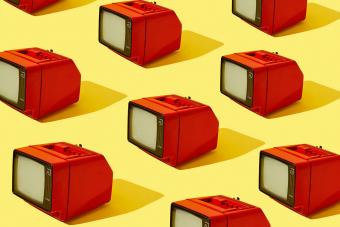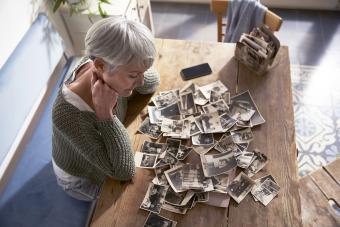
If you have a kid or two in your house, then chances are high that you've got a few decks of random flashcards emblazoned with brightly colored animals or personified letters from the alphabet scattered around your cabinets and drawers. Sometimes none of those pre-made flashcards quite fit the game that you're envisioning to play, but if you've got a couple of sheets of cardstock and a sharpie lying around making your own memory flashcards or other flashcards is incredibly easy. In fact, making flashcards can be fun for the whole family, especially since people of all ages could use a memory tune-up every once in a while.
How to Make Your Own Flashcards and Memory Games
Creating flashcards really doesn't take too much of your time and lets you customize the entire experience for the people playing along with you. For young people and adults, flashcards can simply be words on one side and definitions or answers on the other. That being said, flashcards aren't only useful for kids learning the basics; rather, they're often used as quick study guides for quizzes and tests, and if you get your kids used to using flashcards to go over material, they'll be that much more prepared as they go along further in their studies.
Generally, memory games in particular are geared to younger audiences, and they're often used to help develop children's concentration, observation, and comprehension skills. In addition, more advanced memory games are sometimes used to help measure intelligence in older kids and adults, and memory games sometimes play a vital role in measuring cognizance in the elderly. While you can certainly purchase flashcards and memory games at a variety of stores, they're also easier and cheaper to make from home.
How to Create Flashcards at Home
In most cases, the simplest way to make flashcards is on index cards, or if you're a little digitally savvy, you can edit this downloadable pdf and put your own interesting categories on these pre-set flashcards.

However, if you want to make making flashcards a family affair, check out these simple tips:
- Pick your material - Choose either 3x5 or the 4x6 index cards or print off these blank sheets of pre-made flashcards.
- Keep the audience in mind - Design the information on the cards with your audience in mind. For example, younger kids who're just learning to read need to see neatly printed, large letters and words. Think about adding googly eyes or sparkles for some eye-catching elements to capture their attention and keep them engaged.
- Design cards to suit the subject - If you're creating something like vocabulary flashcards, consider drawing a picture of the word or finding a picture online to cut and paste onto the card to help your kids make visual and audial connections with the words in question.
- Create flashcard quizzes for complex subjects - Flashcards also make for great study aids, so you can put an answer on one side and a question on the other and turn your study session into a game itself.
- Make them last longer - To make your homemade flashcards have greater longevity, laminate them.
Remember--flashcards are great for a variety of review strategies. Whether you need flashcards for vocabulary review, pop quiz or test questions and answers, math concepts, or to teach a child how to alphabetize, they're incredibly easy and inexpensive to make.
How to Create Memory Games at Home
Memory games are often some of the first games that very young children play, and the most common games out there utilize flashcards to reinforce their skill sets using repetition. The most common children's memory game is a simpler version of the popular game Concentration, but if you're feeling particularly creative, creating your own memory can be a fun and easy thing to do as well.
Create Logical Matches
If you're making a memory game for a child, you'll want to find brightly colored pictures that you either draw yourself, cut from magazines, or find on the Internet. Remember that you'll need to create matches for everything. While you don't have to have the exact picture, you do need to find matches that make sense. For example, if you want your child to find similar objects, then search for pairs of birds, types of animals, cars, and so on.
Problem Solving Matches Reinforce Multiple Skills
If language isn't something your child struggles with, but mathematics is, you can create memory flashcards that have equations on one side and the answers on the other. This way, your kids can engage in both memory practice and performing quick calculations as well. You can apply this concept to other subjects, such as vocabulary and definitions or shapes and geometric terms.
Make Flashcards Using Digital Tools
Although most of the free digital tools out there geared towards sharing and creating flashcards are meant for high school studies or higher, some of these websites do offer functions which you can use for younger learners as well. For all of those who're tech savvy, these might be a better option than printing and cutting out dozens of cards yourself. However, most of these online tools don't have a way for you to play a classic matching memory game, so if that's the way you or the people in your life learn best, you'll probably benefit from sticking to the old-school way of making flashcards.
Memory
Memory is a really advanced flashcard making tool where you can craft sets of flashcards out of various languages, incorporate audio and images, and browse other people's flashcards to give a go too. You can use Memory on desktop or mobile and you even have the option of practicing your flashcards on the website or downloading them to print off later.
Cram
Cram takes the bells and whistles out of fancy flashcards and gets back to the basics with its super simplistic flashcard making tool. Customize your information on these classic white cards and once you're done, either save them privately to your account or set them as public to help other learners practice their skills too.
Match the Memory
Available online and all of the different app stores, Match the Memory is a website that lets you create and share your personal memory matching games using your own images and words. You can also play other people's matching games, and since it can be downloaded to tablets and smart phones, it's a perfect tool to keep around for when you're on-the-go but don't want to give up the memory game fun.
Put Your Memory to the Test
Keep all of the brains under your roof mentally sharp as a tack by challenging everyone to a round or two of the memory game you created using your custom flashcards. Your kids may bemoan you pulling out another deck of vocab cards, but when they can remember their full shopping list AND to put the load of laundry in the dryer in the future without having to set fifteen reminders, they'll be thanking you over and over again.







